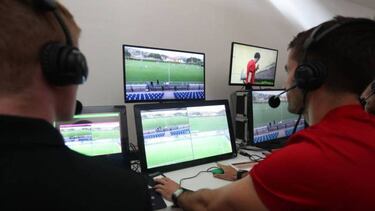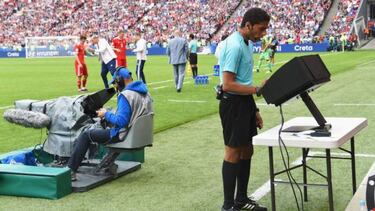Velasco Carballo’s rough guide to VAR
As I’m sure we’re all aware, we’ll have VAR at this summer’s World Cup finals then following that in LaLiga
As I’m sure we’re all aware, we’ll have VAR at this summer’s World Cup finals then following that in LaLiga. Here in Spain, an interesting initiative has been launched - Carlos Velasco Carballo, VAR operational chief for LaLiga, has been organized a series of meetings with journalists to explain how the system works and run through the steps taken which have resulted in the go-ahead to implement the technology in our league. Yesterday, with 10 colleagues, I attended one of Velasco Carballo’s workshops and saw first-hand the good work being done training up the people who will be in charge of the system. It’s just a shame that it won’t be used in tandem with Hawk-Eye technology – a far more precise instrument in certain circumstances.

Those for and those with doubts
Related stories
It goes without saying that VAR doesn’t claim to be a definitive solution - just a way of offering an alternative viewpoint to certain, specific cases. Its introduction reminds me of a conversation I had with Del Bosque (like me, a little skeptical of VAR) and Butragueño (who is all in favour) at the Princess of Asturias awards. Butragueño argued that it is not fair that everyone at home is able to view incidents, including repeats from different angles, which the referee misses. He added that it’s only right that match officials have access to such a system. Of course, that’s a valid argument – for cases such as that Thierry Henry handball, or Frank Lampard’s over-the-line strike which wasn’t given at World Cup South Africa. But it’s less clear how it will work in borderline cases which are debatable and basically down to opinions. It won’t bring an end to controversies, but it probably will end the shameful decisions which tarnish the game.

Ideally, VAR will be used sparingly
It won’t only be used to review goals, offsides, direct red cards and the confusion which sometimes arise in identifying the real culprits when handing out bookings. Neither the teams nor the ref can call for a VAR decision. The match official will continue with the authority to make the final decision. Referees will work in conjunction with another First Division match official who is not on duty that weekend and whose role will be more clearly defined nearer the time. The external match official will notify the ref if something untoward is spotted (hopefully, this incidents will be kept to a bare minimum) and the match official will decide, after watching a replay of the event on the television screen. That still leaves a lot of moves up in the air which one set of fans will view very differently to the other. We’ll have to start getting used to a system which isn’t a miracle cure, but at least it will be implemented following a lot of preliminary work.
